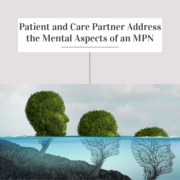MPN Patient and Care Partner Share Tips for Communicating With Your Care Team
MPN Patient and Care Partner Share Tips for Communicating With Your Care Team from Patient Empowerment Network on Vimeo.
MPN Care Partner, Jeff ,and Summer, who is living with myelofibrosis, share how they communicate with Summer’s care team. Jeff shares how important it is to develop a relationship with your care team and find what communication method works best for you.
See More from PEN-Powered Activity Guide 12
Transcript:
Summer:
Oh, Jeff. I’m almost out of my Jakafi. I have to get some more.
Jeff:
Well, I guess we’ll have to give Dr. Tanaka a call, right?
Summer:
Hi, I’m Summer.
Jeff:
And I’m Jeff and we’re here to talk to you today about communicating with your health care team, and it’s very important to develop that relationship. Tell folks about our health care team, Summer.
Summer:
Yeah, we’ve got a great one. We have my doctor, Dr. Tanaka, the nurses and the specialty pharmacy that takes care of my Jakafi. Should I explain about that?
Jeff:
Yeah.
Summer:
Okay. The pharmacy lets me know when I need new medication. It tells me when it comes in. I’ll let them know when I’m going to pick it up. They even offer to deliver it but I don’t think it’s a good idea to have expensive drugs delivered to your porch. So of course, I pick up. It’s no big deal.
Jeff:
And why do we have to use a specialty pharmacy instead of going down to the local pharmacy?
Summer:
Because they have more time and they really keep track of everything. They let me know if there’s a change, they have a question, everything. I really trust them. And they always tell me when the medicine comes in. And if it seems a little late, they call and let me know.
Jeff:
The way we communicate these needs is great for us. Every one of you who has a health care team is going to have a different way of communicating and you really need to learn to use it. We’re very fortunate. We use the University of Southern California health care system here and they have a portal online. They call it the patient portal. It’s called My Chart. And you can send messages to the doctor and your health care team, they can send you messages, you can request refills on your prescriptions there, and you could also make appointments and you can view your test results. Summer, you get a test often, right?
Summer:
Once a month.
Jeff:
And so, we go in and get that, and within the afternoon they usually have our test results and we can look at them. So, we’re very fortunate. If you have one, if your health care organization has such a system, learn to use it. That is your prime communication way of communicating with your health care team. You may be in a location where you can’t do that, they don’t have such a fancy thing, or your cancer may not require that kind of communication, but whatever way you develop learn to use it. It’s really important to develop a way to communicate with your team. And that’s pretty much it for our subject this month. Till next time. I’m Jeff.
Summer:
I’m Summer. Bye.
Jeff:
Bye.






